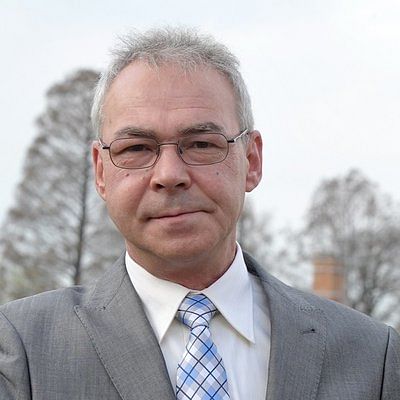We will take our country back (never mind that we’re already a sovereign nation)
A conservative white man — intelligent, patriotic, uneasy, resentful, who’s had enough – Klaus Riedelsdorf, the founder of Alternative for Germany, ticks all the boxes of a rightist German. But he could be from anywhere, writes Roger Cohen in The New York Times. And though Cohen doesn’t agree with anything he says, it’s important to listen to him and recognise him, he writes.
“Propped in his office is one of the AfD campaign posters with the words ‘We will take our country back.’ There are peculiarly German elements to Riedelsdorf’s story — life under the Stasi in a divided Germany emerging from the ruins of Nazism will play with anyone’s mind — but this slogan is the universal cry of rightist reaction. It’s Trump’s “America First.” It’s Brexit. It’s Marine Le Pen’s nationalists against the globalists. It’s behind the word of the moment: sovereignty.”
“The question arises: back from what or whom? In Brandenburg, as in Trump-world, there’s plenty of political energy against globalized, mealy-mouthed, quinoa-loving, inequality-fostering, immigrant-embracing elites with their gender spectra, climate doomsdays, multilateral organizations, mainstream parties and smug no-alternatives views of existence.”
The futile search for peace in disarmament
“Peace is too serious a matter to be left to pacifists,” writes Bret Stephens in The New York Times. He writes this in response to the International Campaign to Abolish Nuclear Weapons, or ICAN – which he calls a “very familiar creature,” another tediously bleating “No Nukes” outfit – winning this year’s Nobel Peace Prize.
In doing so, the peace prize has given legitimacy to the idea that “disarmament, particularly by democracies in the name of setting a good global example, is an essential ingredient of peace.”
“One of the supposed paradoxes of our day is that the past quarter-century has been a golden age of nuclear disarmament…Yet none of this has made the free world safer,” writes Stephens.
The disarmament movement proved tragically successful in disarming the nations that believed in disarmament, wrote Walter Lippmann in 1943. “In the name of peace, the good left themselves increasingly defenseless, their allies and dependents increasingly anxious, their rivals and enemies increasingly ambitious and, in time, violent,” adds Stephens.
“The generation which most sincerely and elaborately declared that peace is the supreme end of foreign policy got not peace, but a most devastating war,” Lippmann wrote.
America says goodbye to liberal internationalism, welcomes illiberal nationalism
America is waving goodbye to values, and saying hello to thugs, dictators and strongmen, The Economist wrote earlier this year. Months later, the fact that Donald Trump has jettisoned the four decades of bipartisan consensus of liberal internationalism for American interests (as though they were ever conflicting) has only become more evident.
“Far from conflicting with America’s interests, argues Ted Piccone, a former foreign policy adviser in the Clinton administration now at the Brookings Institution, advancing normative values is essential to those interests, and is the basis for America’s national prestige and international legitimacy,” reads the piece.
“America has had close relationships with odious regimes in the past, and has on occasion offered hypocritical justifications for self-interested policies. But the guiding principle, articulated by Woodrow Wilson a century ago, that it should use its power for good in the world has endured.”
Donald Trump stands for something different: “a contemptuous repudiation of the use of American strength in the service of anything other than self-interest. His enthusiasm for a brute like Mr Duterte gives heart to brutes everywhere.”
Shouldn’t there have been a coup in Pakistan by now?
There’s a political war raging in Pakistan, a foreign crisis brewing in Afghanistan and DC, and the country’s institutions are under attack. So why is there not a coup yet, asks Cyril Almeida, somewhat provocatively, in Dawn.
“There’s a template for a coup and it goes something like this. The government is paralysed, Nawaz is on the warpath, the boys have had enough, the chief moves in.
“Throw in a bit of anti-US and anti-India hysteria and you may even wonder why we haven’t already had a coup.”
However, “this time no one seems to be cheering on the only chap who can pull the trigger. It’s as if no one wants the chief to become chief executive. It’s as if we still have a new chief; a fresher still finding his feet. Something is off. And it may not be good for any of us. The best-case scenario is a chief who is sure he can’t take over, whether he wants to or not. We’re clearly no longer in that terrain. The next best thing is a chief who is sure he can take over, but doesn’t want to take over. If we were blessed, that’s where we’d be right now. But in the realm of a chief who everyone thinks is too soft to take over and in any case don’t want him to take over? We may be tempting the gods.”
UK’s terror laws are terrorising the innocent
UK is terrorisng the innocent instead of countering terrorism through its “misguided terror laws,” writes Rizwan Sabir in Al Jazeera. By increasing the jail sentences for viewing terror content, the government is only prompting individuals and institutions to self-discipline and censor their ideas, behaviours, and activities, he writes.
“The offence ignores the reason why a person holds or views such information or what they intend to use it for. Simply put, the reason why you possessed a military training manual or a list of soldiers is irrelevant for the purposes of this law. It is the nature of the information that is a crime; not the intention of the person who views or possesses the information. In practice, this means that a student studying terrorist groups, an academic writing a book on armed movements, or a journalist reporting on military personnel could potentially find themselves facing arrest, charge, and prosecution for terrorism, if they are found viewing or holding such information.”



